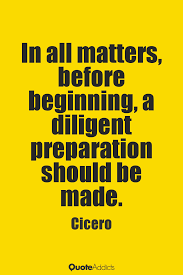 The quote to the right couldn’t be more true. While it is spot on for everyone, it is especially true for leaders.
The quote to the right couldn’t be more true. While it is spot on for everyone, it is especially true for leaders.
Some (relatively small) percentage of the population is naturally inclined to plan, but most of us just aren’t. So people’s (including yours and your employees’) first inclination in the face of a new project or challenge is to jump right in and “get to work.” Planning, of course, is work, but it doesn’t feel like progress, so we all want to “dive in,” “move forward” and “get started.” We are inclined to skip planning, and it’s a big mistake.
The ability to plan well is one of the most important leadership skills you can possess. But the reminder, the reinforcement, and the enforcement of planning among your employees is equally important.
If you aren’t coaching your employees and encouraging them to devote time to planning, chances are you experience mistakes, oversights, delays, missteps, blown budgets and more. People simply aren’t taking the time to weigh their options, consider issues that could arise, and prepare for worst case scenarios. While diving in and getting to work has its merits, the first step of that work should be to plan. When you do so, you drastically increase your chances of success.
So are you and your employees truly prepared? Take some time today to answer these questions:
- What projects or initiatives are currently underway?
- How much time did we spend planning for each project?
- Did we plan enough to make them successful?
- What problems have we experienced that we could have prevented if we had planned more?
- What new projects are forthcoming?
- How do I ensure we plan effectively for them?
- What action items do I need to assign/meetings do I need to schedule to ensure that we plan enough?
After you’ve done your analysis, make improvements where necessary. For example, schedule an initial planning session as the first step of every project. Involve employees in the planning by delegating specific tasks to each person, including research, data gathering, problem finding (in which someone actively looks for issues that could arise) and so on. Spending time upfront will definitely save you time and heartache later on.

0 comments